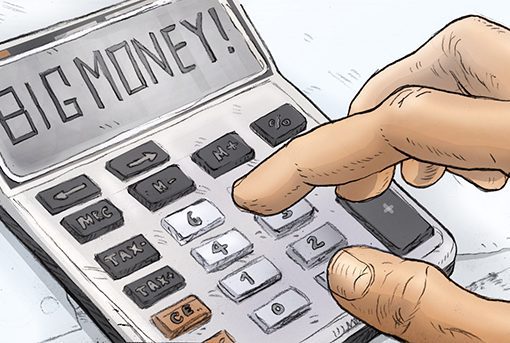The exchange of tax-related information between Chinese and Canadian financial institutions, namely Article 14 of the CRS, has become the hottest topic recently.
What to exchange?
Let’s try some straightforward words to describe it. China and Canada have offered the financial information of their own non-tax residents to the other side, as per the Announcement # 14 of the CRS agreement. The purpose of the “CRS Swaps” is to eliminate the individuals and businesses that are involved in tax evasions by using their overseas accounts. Tax resident accounts are not covered by CRS swaps.
The financial information being exchanged includes cash accounts under personal and business names, trust accounts, cash value insurance, annuity contracts, securities and futures accounts, equity or claims.
The following financial information is not included in the exchange: real estate, jewellery, calligraphy and painting (not your kids’ paintings), sports cars, yachts, sailboats…
Let’s once again talk about the concept of “non-tax residents”. Don’t confuse immigration status and tax status here. In Canada, some people have citizenship or immigration status with the Immigration Bureau, but they can be non-tax residents with CRA; otherwise, a person may be a student or visitor in Canada but s/he can be a Canadian tax resident.
Why Exchange?
The purpose of the exchange is to levy taxes. In the past, it was much safer for the rich to transfer their funds overseas. Now there is a CRS information exchange. Once they are informed by the government of the country where the tax is concerned, they should not only explain the source of funds abroad. The method of exiting funds, paying taxes, may also involve criminal liability.
The basis for information exchange is the China-Canada tax treaty. The tax treaty was originally designed to avoid double taxation. It states that a natural person can only be a tax resident of a country, so once it is recognized as a tax resident of Canada, it is no longer a tax resident of China, and vice versa.
Thus, the Canada Revenue Agency (CRA) has two things to say.
The first one: Since you are my tax resident, you must report your global income and overseas assets. Subtext: You have to pay taxes to me
The second one: If you are not my tax resident, you must be the tax resident of China (or any other countries), I will then tell the Chinese government about your property status in mine. Subtext: think about it carefully, or maybe you want to return to my tax kingdom and pay me taxes
What the Chinese government thinks is that, Ah! In the exchange of information, this person has 200 million deposits in Canada! So what is the source of funding? I want to see if this is tax clean before it exited from China. If not, some punishment will be there.
How to change?
To clarify, the process of information exchange between Chinese and Canadian financial institutions was not initiated in September 2018, but was much earlier.
- Each country that has signed a CRS agreement requires its financial institutions to verify the accounts of all businesses and individuals based on the balance before the end of June 2017, in accordance with Article 14 of the CRS.
- By the end of December 2017, all accounts with a balance of more than $1 million on June 30, 2017 were identified.
- Before May 1, 2018 (and before May 1 of each year thereafter), financial institutions report reportable account information to the state.
- Beginning in September 2018, the governments of China and Canada exchanged information on the above reportable accounts.
- Prior to December 31, 2018, CRS financial institutions identified individuals whose total balance was less than $100 but above $250,000 on June 30, 2017.
- Beginning in September 2019, the second exchange of information for reportable accounts.
- Each September is the so-called “swap” month.
Supplementary Regulations
- Beginning July 1, 2017, all individuals and entities that have opened a financial account in Canada are required to complete a self-certification form stating the country of the tax account holder’s tax status, tax number, address and contact details.
- It is not feasible to open an account with someone else’s name to avoid being exchanged. Because the CRS is to exchange the account information of the account controlling person, that is, the actual operator of the account, and not necessarily the information of the named owner.
- Transfer assets to countries and regions that have not yet joined the CRS. Among the countries that have not signed the CRS, the United States is receiving much attention. However, the United States has long had the Fat Cat Act (FATCA), and its overseas tax auditing power is even greater. Moreover, the number of signatories to the CRS is increasing, and it will change according to the global economic situation and national policies. Now it is not signed and cannot be guaranteed. Don’t sign in the future. Spending money on buying a passport in a country that has not signed a CRS does not guarantee that it will not be exchanged for a lifetime.
- Some people want to turn financial assets into real estate. Because CRS only exchanges financial account information, real estate is not in exchange. This approach should consider the liquidity and value-added of real estate. For high net worth individuals, it is recommended to combine tax issues with asset protection and the inheritance of family wealth for overall planning.
- Reducing the balance of financial institutions below $250,000 to avoid being identified, this approach is recognized as a non-permanent measure.
CRA’s Actions
The affairs between the governments can’t be controlled by us, but let’s just say you are a Canadian tax resident, where are the CRA waiting for you?
- First, once the CRA finds that you have more than $100,000 in assets outside Canada, it is not declared, with a fine of $25/day and a maximum of $2,500/year. At this time, you can consider asking your accountant to make a voluntary disclosure of the VDP program to fight for fines.
- Second, once the CRA finds that you have unreported income outside of Canada, you must open your mouth to collect taxes, collect interest, and receive fines. For example: If you immigrated to Canada in 2016, the assets in China in 2017 will generate 100 million RMB of personal income (equivalent to 20 million Canadian dollars), and you have paid 35 million RMB to the China Taxation Bureau. A tax equal to 7 million Canadian dollars. Then the CRA said that this billion is your global income. According to the Canadian tax scale, you need to pay a tax of 10 million Canadian dollars. Since you have already paid 7 million in China, you can pay Canada 3 million Canadian dollars.
Conclusion
For the exchange of financial institutions information, there is no need for a cup of snake shadow. The exchange of tax-related information involves the manual collection and operation of information by the two countries, and does not mean that the overseas accounts of all people must be exchanged. However, if you have forgotten the declared overseas assets and income, don’t underestimate the enemy, or suggest to consult a professional, if necessary, be a VDP (the above-mentioned CRA’s active disclosure plan), buy a peace of mind.
Please note the above article was translated to English by Google Translate. Please excuse the grammatical errors that can hardly be avoided, unfortunately.


